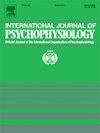Effects of acute sleep deprivation on post-error adjustments and error processing
IF 2.5
3区 心理学
Q3 NEUROSCIENCES
引用次数: 0
Abstract
The study investigates whether individuals can effectively monitor errors and make adaptive adjustments following acute sleep deprivation. Thirty-three university students (16 males and 17 females) performed the Flanker task before sleep deprivation (pre-SD), after 24 h of sleep deprivation (SD-24), and after 36 h of sleep deprivation (SD-36). An electroencephalogram (EEG) was used to collect error-related negativity (ERN) and error positivity (Pe) components, which index error detection and error awareness, respectively. Verbal reports were also employed to measure error awareness. Results showed that post-error slowing effects were present in all three conditions, with the smallest effect observed at SD-24. Post-error improvement in accuracy was only evident at SD-36. Error awareness was lowest at SD-24, with no significant difference between SD-36 and pre-SD. The Pe amplitude significantly reduced at SD-24. The study shows that post-error slowing effects persist following acute sleep deprivation, and post-error adjustments do not decline further with longer deprivation but instead show some recovery. The findings provide empirical evidence for post-error adjustments after acute sleep deprivation and support the existence of neural compensatory mechanisms.
急性睡眠剥夺对错误后调整和错误处理的影响。
这项研究调查了个人是否能有效地监测错误,并在急性睡眠剥夺后做出适应性调整。33名大学生(男16名,女17名)在剥夺睡眠前(pre-SD)、剥夺睡眠24 小时(SD-24)和剥夺睡眠36 小时(SD-36)后完成了Flanker任务。采用脑电图(EEG)收集错误相关负性(ERN)和错误正性(Pe)分量,分别表示错误检测和错误意识。口头报告也被用来测量错误意识。结果表明,三种情况下均存在误差后减缓效应,其中SD-24的影响最小。误差后准确度的改善仅在SD-36时明显。SD-24的错误意识最低,SD-36与sd前无显著差异。SD-24时Pe幅度明显减小。研究表明,在急性睡眠剥夺后,错误后减缓效应持续存在,并且错误后调整不会随着睡眠剥夺时间的延长而进一步下降,反而会有所恢复。研究结果为急性睡眠剥夺后的错误后调整提供了经验证据,支持了神经代偿机制的存在。
本文章由计算机程序翻译,如有差异,请以英文原文为准。
求助全文
约1分钟内获得全文
求助全文
来源期刊
CiteScore
5.40
自引率
10.00%
发文量
177
审稿时长
3-8 weeks
期刊介绍:
The International Journal of Psychophysiology is the official journal of the International Organization of Psychophysiology, and provides a respected forum for the publication of high quality original contributions on all aspects of psychophysiology. The journal is interdisciplinary and aims to integrate the neurosciences and behavioral sciences. Empirical, theoretical, and review articles are encouraged in the following areas:
• Cerebral psychophysiology: including functional brain mapping and neuroimaging with Event-Related Potentials (ERPs), Positron Emission Tomography (PET), Functional Magnetic Resonance Imaging (fMRI) and Electroencephalographic studies.
• Autonomic functions: including bilateral electrodermal activity, pupillometry and blood volume changes.
• Cardiovascular Psychophysiology:including studies of blood pressure, cardiac functioning and respiration.
• Somatic psychophysiology: including muscle activity, eye movements and eye blinks.

 求助内容:
求助内容: 应助结果提醒方式:
应助结果提醒方式:


